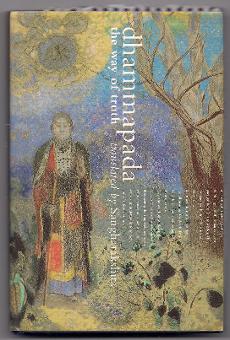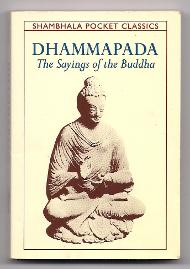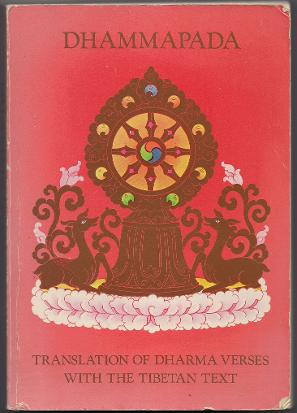The Dhammapada
Over the next few sessions we shall be looking at some verses from the Dhammapada. These verses although they can be categorised as miscellaneous contain some of the most important Buddhist teachings. We shall be looking at three different translations: by Sangharakshita, who is the founder of the Triratna Buddhist Order, a pocket version by Thomas Byron, Ph.D ., and a version by DHARMA Publishing which also contains the verses in Tibetan.
Session 1 Pairs
Session 2 Flowers
Session 3 The Seeker
Session 4 Happiness
Session 5 Anger
Session 1: Pairs
1
Experiences are preceded by mind, led by mind ,
and produced by mind. If one speaks with or acts with an
impure mind, suffering follows even as the cartwheel
follows the hoof of the ox drawing the cart.
2
Experiences are preceded by mind, led by mind ,
and produced by mind. If one speaks with or acts with a
pure mind, happiness follows like a shadow
that never departs.
3
Those who entertain such thoughts as
“He abused me, he beat me, he conquered me,
he robbed me” will not still their hatred.
4
Those who do not entertain such thoughts as
“He abused me, he beat me, he conquered me,
he robbed me” will still their hatred.
5
Not by hatred are hatreds ever pacified here in the world.
They are pacified by love.
This is the eternal law.
6
Others do not realise that we are heading for death.
Those who do realise it will compose their quarrels.
7
As the wind blows down a weak tree,
so Mara overthrows one who sees the unlovely as lovely,
whose senses are uncontrolled,
who is immoderate in food, lazy, and of inferior vigour.
8
As the wind does not blow down the rocky mountain peak,
so Mara does not overthrow one who lives seeing the unlovely as unlovely,
whose senses are controlled,
who is moderate in food, and whose faith and vigour are aroused.
9
He is not worthy of the yellow robe
who takes it while still not free from impurity,
and lacking in self-restraint and truth.
10
He is worthy of the yellow robe
who has made an end to all impurity,
who is well-established in virtuous conduct (sila),
and who is endowed with self-restraint and truth.
11
Those who take the unreal for the real,
and who in the real see the unreal,
they, wandering in the sphere of wrong thought
will not attain the real.
12
Those who have known the real as the real,
and the unreal as the unreal,
they, moving in the sphere of right thought
will attain the real.
13
As rain penetrates the badly-thatched house,
so lust enters the spiritually undeveloped mind.
14
As rain does not penetrate the well-thatched house,
so lust does not enter the spiritually well-developed mind.
15
The evildoer grieves in both worlds;
he grieves 'here' and he grieves 'there'.
He suffers and torments himself seeing his own foul deeds.
16
The doer of good rejoices in both worlds;
he rejoices 'here' and he rejoices 'there'.
He rejoices and is glad seeing his own pure deeds.
17
The evildoer burns in both worlds;
he burns 'here' and he burns 'there'.
He burns with remorse thinking he has done evil,
and he burns with suffering having gone
after death to an evil state.
18
The doer of good delights in both worlds;
he delights 'here' and he delights 'there'.
He delights in this life thinking he has done good,
and he delights after death having gone
to a state of happiness.
19
He who for his own benefit constantly recites
the canonical literature but does not act accordingly,
that heedless man, like a cowherd that counts the cows of others,
is not enriched by the ascetic life.
20
He who for his own benefit constantly recites
even a little of the canonical literature
but lives in accordance with its principles,
abandoning craving, hatred and delusion,
possessed of right knowledge with mind well freed,
clinging to nothing in this or any other world,
he is enriched by the ascetic life.
Session 2: Flowers
Who shall conquer this world?
Who shall discover the shining way of truth?
You shall! Just as the person who seeks flowers
finds the most beautiful, the rarest.
Understand that the body is merely the foam of a wave;
the shadow of a shadow.
Death overtakes those who gather flowers
when with a distracted mind and thirsty senses
they search vainly for happiness
in the pleasures of the world.
Look to your own faults: what you have done
and what you have not done.
Do not dwell on the faults of others.
Like a lovely flower which is bright but without scent
are the fine but empty words
of a person who does not mean what they say.
Like a lovely flower which is bright and fragrant
are the fine and truthful words
of the person who means what they say.
The perfume of sandalwood, rosebay or jasmine
cannot travel against the wind
but the fragrance of virtue
travels even against the wind,
as far as the ends of the world.
Session 3: The Seeker
From the Byrom translation
Restrain your senses,
What you taste and smell,
What you see, what you hear.
In all things be restrained
Of what you do and say and think
Be free.
You are a seeker.
Delight in the restraint of your hands and your feet,
Of your words and your thoughts.
Delight in meditation and in solitude.
Compose yourself, be happy.
You are a seeker.
Follow the truth of the way.
Reflect upon it. Make it your own.
Live it. It will always sustain you.
From the Tibetan translation
The seeker who lives in loving kindness
and clear vision of the Buddha's teachings
obtains the highest happiness of peace.
Cut away the 5 hindrances;
(hatred, anxiety, sense desire, sloth/torpor, doubt)
Develop the 5 virtues
(faith, effort, mindfulness, concentration, wisdom)
The seeker who transcends the 5 attachments
(greed, hatred, delusion, pride, false teaching)
is called one who has crossed the flood.
Meditate and be vigilant!
Do not let the mind's demands
delude you.
Do not through heedlessness swallow a red hot iron ball
and then when it scorches you cry out “What torment!”
Without wisdom there is no meditation; without meditation
there is no wisdom.
Whoever is endowed with both meditation
and wisdom abides very close to Nirvana.
We began the session with the following poem by Tsoknyi Rimpoche
Sometime go outside and sit,
In the evening at sunset,
When there's a slight breeze that
touches your body,
And makes the leaves and the trees
move gently.
You're not trying to do anything, really.
You're simply allowing yourself to be,
Very open from deep within,
Without holding onto anything
whatsoever.
Don't bring something back from the past,
from a memory.
Don't plan that something should happen.
Don't hold onto anything in the present.
Nothing you perceive needs to be nailed
down,
Simply let experience take place, very freely,
So that your empty, open heart
Is suffused with the tenderness of
true compassion.
Tsoknyi Rimpoche
Session 4: Happiness
Never feeling hatred towards those who bear us malice,
how wonderful our lives become,
free from enemies even in the midst of the most unfriendly.
Never harming those who would hurt us,
how wonderful our lives become,
never harmed even in the midst of harmful people.
Never feeling selfish even in the midst of selfish people,
how wonderful our lives become,
free from possessiveness
even in the midst of those who would take everything.
The victorious attract enemies; the conquered lie down in sorrow.
But when you give up both victory and defeat,
you will rest in happiness and peace.
Health is the greatest possession; contentment the greatest wealth.
A loving friend is the best of kin,
and the greatest joy is passing from sorrow.
How wonderful to see the saints;
one always finds joy in their company.
But with fools it is a different story.
Not to see them makes us happy.
Keeping company with fools will cause you nothing but grief.
Fools are the worst of enemies; they will keep you suffering.
Keep company with the trustworthy; they will make you happy.
Rely on the noble, the spiritual, the steady;
the learned, the prudent, the wise.
One wise enough to follow such beings
is like the moon on the path of the stars.
Session 5 Anger
We began the session with a statement of the three Lakshanas and how they can be brought to the forefront of
our minds by any strong emotional response.
The three Lakshanas
also called the three Universal Truths or the three marks of conditioned existence.
This is the meaning of the Universe. This is the basis of Buddhism.
Unsatisfactoriness or Suffering or Stress or Tension or Friction.
Impermanence. All things change. Life is Flow
Insubstantiality. All things (including ourselves) are ungraspable. There is no fixed self. (No soul)
Each time we see the inherent nature of any of the above is an opportunity to move us closer to enlightenment. To see momentarily more clearly how the Buddha saw things.
A time of strong emotion, perhaps when we are angry, is a chance to see into one or more of these three marks. So although anger is probably a negative mental state it can provide an opportunity for development.
So
the verses on anger and also moments when we are angry can be a real
opportunity and not just a negative experience.
Anger
Whoever holds their rising anger in check,
as a driver controls his chariot,
this is the one I call a charioteer;
the others only hold the reins.
Overcome anger with good nature;
overcome hatred with goodness;
overcome greed with giving and
overcome lies with the truth.
Speak the truth; control your temper;
give what you can when asked.
By these three virtuous actions,
you draw near to the way things really are.
They blame you for being silent;
they blame you for talking too much.
They blame you for watching what you say.
No one in the world can go unblamed.
There never was, nor will there ever be,
nor does there now exist,
a person who is always blamed or always praised.
But the one who is daily praised by the wise,
the one who is blameless,
is the one with ethics and integrity,
the one with fine knowledge.
Gain mastery over your body;
guard yourself from acting angrily.
Keep yourself from unskillful action;
use your body well.
Gain mastery over your speech;
guard yourself from speaking angrily.
Keep yourself from speaking wrongly;
use your speech well.
Gain mastery over your mind;
guard yourself from angry thoughts.
Keep your mind from mental baseness;
use your mind well.
The
steadfast are controlled in body
and controlled in speech;
the steadfast are controlled in mind.
This is perfect mastery.


